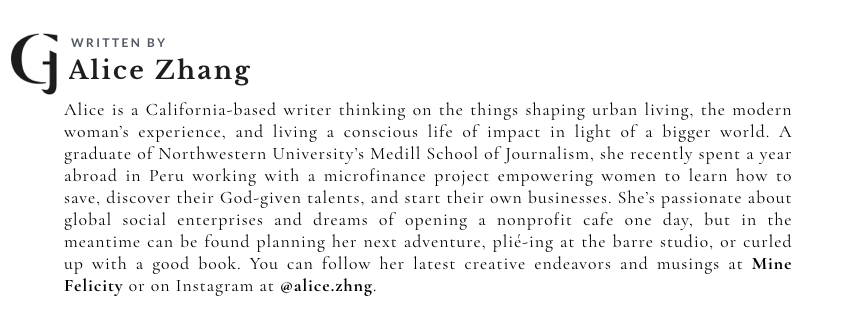
Demystifying Feminism: 5 Ways To Support Girl-Power Movements Around the Word
“If there ever comes a time when the women of the world come together purely and simply for the benefit of mankind, it will be a force such as the world has never known.”
Women are one of the world’s greatest untapped resources – though they represent over half of the global population, they account for two-thirds of the world’s poorest citizens and two-thirds of the world’s illiterate population. But reality shouldn’t be so unbalanced when the equation is simple: empowered women = empowered changemakers.
It’s time for us to be bold and empower other women, putting pep in the step of girl-power manifestos around the world and demystify the “f” word. Though “feminism” is still a term that needs to be reclaimed (yes, you can have an affinity for Millennial pink and stand on either side of the blue-red political spectrum!), championing women is simply the idea that women and girls should be allowed to freely pursue their dreams and career goals without being punished or held at a disadvantage for doing so. Instead of hitting a gendered glass ceiling, they should be cheered on in their pursuits and be able to express their individual freedoms.
Championing women is simply the idea that women and girls should be allowed to freely pursue their dreams and career goals without being punished or held at a disadvantage for doing so.
In many parts of the developing world, this empowerment starts with lifting women out of poverty and difficult social situations where this freedom is hindered, then by providing access to education and social services, and fighting for specific rights on political and social levels. When women’s lives are transformed, they can impact change in their families and communities.
Though these endeavors can seem lofty, here are some tangible ways that we, as global citizens, can take part in the girl-power movement, wherever we are in the world.
1. Read Up
Garner global perspective by educating yourself on important issues, so you can educate others.
Step one: arm yourself with knowledge and educate yourself on where other women around the world stand. There are so many great resources out there, perfect for all kinds of learners. Start with building blocks like Chimamanda Ngozi Adichie’s TED talk “We Should All Be Feminists,” Emma Watson’s UN speech, or sit down with a bowl of kettle corn to watch Girl Rising, a documentary that spotlights the unforgettable stories of nine girls living in the developing world (including the voices of Cate Blanchett and Selena Gomez).
For bookworms, browse through the stacks at your local library or do some Amazon research – there are plenty of books tagged in Goodreads’ feminist books category, including the I am Malala and Reading Lolita in Tehran, which tells the story of a group of resilient female students in Iran who hide away “in the face of tyranny” to read forbidden Western literature.
You can also plug in your earphones and take your learning on the road, tuning into some well-produced feminist podcasts during your daily commute. A great one is Smart Women Smart Power, which features leading women from the corporate, government, and national security worlds discussing top international issues.
If you’re ready to put pen to paper, try auditing a class on Coursera like “Women in Leadership: Inspiring Positive Change” to learn how to lead in your own workplace. If you’re going to champion women, sometimes this means taking off the rose-tinted glasses (spoiler alert: gender inequality still exists!), and learning that change can start from the individual.
2. Advocate!
Roll up your sleeves and volunteer with an organization.
There are hundreds of corporations, nonprofits, B-corps, and social enterprises dedicated to helping women around the world. International Justice Mission partners with local authorities in the developing world to end sex trafficking, rescue and support survivors, and bring criminals to justice. Meanwhile, the United Foundation’s Girl Up initiative has clubs all over the world that give adolescent girls the leadership skills to “rise up” in their communities. Host a fundraising event, attend a local conference, get involved in campaigns like the Global Fund for Women, or “share the facts” that organizations like Girls Not Brides provide that are already 140-character ready.
Politically, many nonprofits including CARE, a humanitarian organization that fights poverty around the world by putting women and girls at the center, have advocacy networks such as Care Action that loop in supporters to sign petitions, spread the word, and stay involved with the latest news and events in your state. Girl Up also encourages supporters to tweet at elected officials, and provides an advocacy toolkit to learn about the best ways to evoke change.
3. Support Existing Entrepreneurial Women
Support women-owned companies and ventures.
One of the best ways to advocate for change is to accelerate the growth of the women already putting their ventures in motion. Start by making conscious choices about the everyday clothes you wear, and choose to support fair trade brands. Some of our favorites include Tribe Alive’s minimalist pieces made by women in Guatemala, Haiti, India, and Honduras, Krochet Kids’ cozy beanies knit by Peruvian and Ugandan women, ShareHope’s workout leggings made by a female collective in Haiti, among other ethical clothing brands.
Another way to support #girlbosses around the world is by lending a microloan to entrepreneurial women via crowdfunding platforms like Kiva. Women tend to have less access to formal financial institutions and saving mechanisms (47 percent compared to 55 percent of men, according to the World Bank), so these microloans can go a long way. On Kiva, loan terms range anywhere from eight months to two years (plus or minus), and you’ll be making both a capital investment and a human one as you read updates about the growth of your borrower’s business. Pro tip: Corporations will also frequently match contributions, so do a filtered search and check the box for “matched loans” to find opportunities where you can double your dollar.
“Women reinvest 80 percent of their income into the well-being of their children, meaning any investment often has ripple effects for future generations. ”
By empowering women to lead, they can continue to sustain their own businesses, find financial independence, and take ownership for what’s theirs. Studies have shown that on average, women reinvest 80 percent of their income into the well-being of their children, meaning any investment often has ripple effects for future generations.
4. Humanize The Experience: Go abroad
Travel international to gain diverse perspectives.
At the end of the day, oftentimes the best way to become an engaged global citizen is by traveling in it, and meeting these valiant women and girls face to face! Plan a trip, and go somewhere you might not otherwise visit – be it a spontaneous backpacking trip through South America or through a formal volunteer trip. Many organizations in the likes of Hiptipico host organized artisan visit trips so you can meet the Guatemalan women behind the handbags. Meeting the Peruvian women behind Krochet Kids and Nisolo changed my personal perspective on artisan communities and fast fashion.
Hand in hand with providing financial support, supporting a girl in a developing country is a great way to put yourself in someone else’s shoes and start a long-term, international friendship (and pen pal!). For around $1/day, many long-standing charities like Compassion International, World Vision, Children International, and Food for the Hungry provide food, education, and healthcare to girls around the world, and often give you the opportunity to visit your child, too.
If you can’t afford the time or resources to leave the country, a modern way of immersing yourself into another world is by harnessing the power of technology. Many social enterprises have begun to use virtual reality to give viewers a 360-degree experience of the field work happening on the ground, and to “live” a day-in-life of someone from another country. Curious supporters can watch some of UNICEF’s various virtual reality films using a simple Google Cardboard or online viewer, such as VR film Clouds Over Sidra, a 360-degree documentary about Sidra, a young Syrian girl who lives in a refugee camp in Jordan. Other organizations, including HOPE International have also created their own VR experiences.
5. Give Financially
Donate to women’s focused philanthropic ventures.
With all the different ways to engage, sometimes the most direct way to spark change is to contribute financially. Do some research on the companies whose mission statements most align with the issues closest to your heart, and start a monthly giving plan – you don’t have to wait until the last day of December to give! In fact, giving regularly and earlier in the year will help nonprofits better plan their budgets, allowing them to make the most impact with your dollars during the fiscal year.
There are so many great organizations, like the ones listed in this article, as well as UN Women, Girls Inc, Malala Fund, Girls 20, Women for Women International, She’s The First, and even your local Girl Scouts chapter that you can support. Dig deep into their work and look into the charity’s transparency and effectiveness with Charity Navigator, which also provides its own list of four-star charities (the highest rating possible). You can also donate to specific projects and causes via the crowdfunding platform Global Giving, sorting for women and girls’ projects.
Lastly, it’s worth noting that your workplace (especially if it’s a larger company) might already have ongoing initiatives that directly or indirectly support these causes, like Goldman Sachs’s 10,000 Women initiative or the Tory Burch Foundation’s dedication to support women entrepreneurs. Talk to your manager or human resources coordinator to find out where you can donate to existing efforts at work.
To echo the words of Michelle Obama, “No country can ever truly flourish if it stifles the potential of its women and deprives itself of the contributions of half of its citizens,” and now is a better time than ever to champion our sisters around the world. If you’re looking for a shorter mantra, here’s one from Rosie: ‘we can do it!’
Know of any other “girl power” organizations working around the globe? Share and comment below!
““No country can ever truly flourish if it stifles the potential of its women and deprives itself of the contributions of half of its citizens.””
